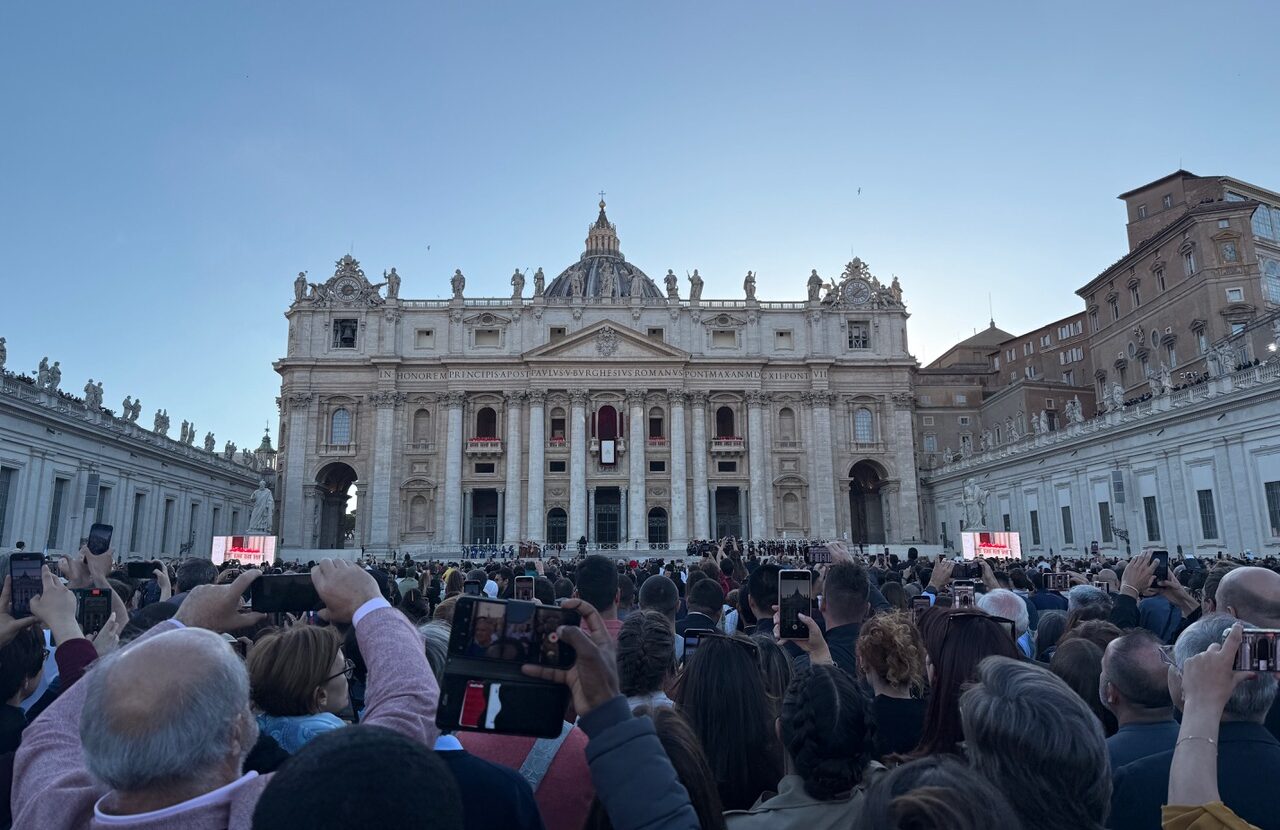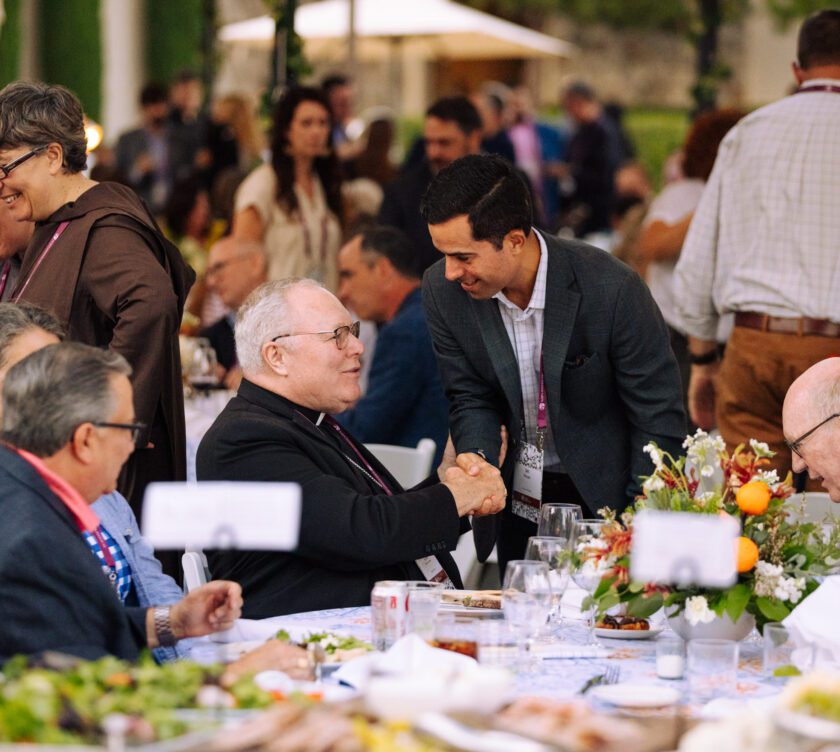The corner of my eye caught the live YouTube feed of the Sistine Chapel chimney:
white smoke billowing out.
Well, not pure, white smoke, but it seemed like a light grey. Much lighter than the black
smoke I observed from the Piazza on Wednesday evening and Thursday morning. A
nanosecond passed as the neurons fired. Something felt different and it became clear
this was white smoke indeed—much sooner than expected. I turned to a priest friend
with me and said “there is white smoke. Let’s go.”
We sprinted down the cobbled streets of Rome. We were only a 12-minute walk from St.
Peter’s Square, but it seemed much further. I could feel the adrenaline rush. As we ran,
most of the ordinary Roman world still did not seem to know the news and continued
about as normal. Perhaps this is how Saints Peter and John felt as they ran to the
empty tomb. Your brain wanted to process what was happening, but your heart and gut
said “run”.
After the first few blocks my friend said he was not able to get one of his shoes fully on,
so we paused for him to adjust it. It reminded me of President Trump telling his Secret
Service detail to let him get his shoes on after he had been shot. The mundane and
ordinary inconvenience of misaligned footwear impacting your experience of an event of
a much grander caliber. We are still human.
We slowed down a bit as we saw Saint Peter’s Basilica. Weaving and dodging among
the crowds, we did our best to balance Christian politeness with a zealous desire to be
close to the action. I thought to myself “if we can be just outside Saint Peter’s Square, I
will be happy. As long as I can see it with my own eyes, I will be content that I really was
there.”
On and off we went from quick jogs to tiptoed serpentines through open pockets among
the people. We saw the white smoke still puffing from the chimney as we got closer. The
basilica bells rang out. The sound, the resonance, the timelessness of the tolling of bells
made it all the more real. I thought back to Pope Francis’ funeral a short while ago when
I last heard those great bells. Once to mourn the death of the Roman Pontiff and now to
announce a new one.
As we got to the edge of the square, I saw it still was not full, and we could make it in.
This meant going through security checkpoints set up by the Italian Polizia complete
with metal detectors and x-ray machines. Patiently, or perhaps impatiently, we waited
our turn and made it into the square. Quickly moving, we found our vantage point 50
yards or so in front of the Egyptian obelisk which the Pagan Emperor Caligula brought
to the Eternal City and which the Christian Pope Sixtus V moved to its present location.
The crowd was jubilant. Strangers gathered and conversed as if friends. The common
fraternity of the Christian faithful was very much alive. Flags from all around the world
waved. A Ugandan near me and I chatted. He congratulated me on sharing the first
name of Saint Charles Lwanga from his country. All were kind. All were polite. All were
united.
Then the curtains were pulled back, the glass doors opened, the cardinal protodeacon
emerged and announced a great joy to the faithful: “Habemus Papam” or “we have a
pope.” Energy exuded with applause and cheers. An ancient language and an
antiquated public address method used for centuries to announce the election of the
Bishop of Rome still bears resonance in the age of the smart phone and livestream.
My friend said they elected Cardinal Prevost as we listened to the speech. An
American? No. That could not be. The prognosticators said a pope from the United
States was not possible. Then the protodeacon said the new pope’s name is “Leo.” We
lit up. A heroic pope from the nineteenth century was the last to bear the mantle of Leo.
He cared for the poor and he cared for the truth. A good predecessor to emulate.
Then, to the balcony came His Holiness Pope Leo XIV. Our new Holy Father. The Vicar
of Christ, Successor to the Prince of the Apostles, etc., etc.
He smiled. He waved. The crowd responded with joy.
He spoke in Italian. I do not really know the language, but I could pick up some of what
he said. He spoke about peace. He spoke about Christ and his Church. He spoke about
evangelization. He asked us to pray. He spoke like a pope. No—he spoke as the Pope.
Then he gave his blessing. Using a formula reserved for the pope’s Urbi et Orbi address
usually only on Christmas and Easter—and also on the occasion of the election of a
Supreme Pontiff.
“Sancti Apostoli Petrus et Paulus,” he began. Invoking the intercession of those ancient
apostles who evangelized the city of Rome two thousand years ago. We closed our
eyes and bowed in absolute silence as he continued.
Hearing the Holy Father pray was when the gravity of what was happening really set in.
We were in the square with the successor of Saint Peter as countless pilgrims had in
the preceding centuries. The community of the faithful, the Church teaches, is not just a
community of the living, but those who have gone before us. It was clear to me at that
moment in particular that this was certainly the case.
After crossing ourselves we looked up. He paused and waved and smiled. He did not
immediately retreat. He let the moment go on. He let it continue. He let us share in it for
a bit longer. He who has now given his life to the papacy, to the Church, and to Christ,
gave something to us too: an extra minute with him.
It was an experience which I never will forget. Sometimes the most profound things are
those that change the least over time. Tradition, culture, truth, faith. These are what
make us human, and these are what make us Christians.
Cardinal Francis George of Chicago recalled at the 2005 election of Pope Benedict XVI
that as he looked out from the balcony of Saint Peter’s Basilica, “I was gazing toward
the Circus Maximus, toward the Palatine Hill where the Roman emperors once resided
and reigned and looked down upon the persecution of Christians, and I thought, ‘Where
are their successors? Where is the successor of Caesar Augustus? Where is the
successor of Marcus Aurelius? And finally, who cares? But if you want to see the
successor of Peter, he is right next to me, smiling and waving at the crowds.’”
Let us pray for our new Holy Father. Let us pray for his health and his success. Let us
pray that he leads Church as Christ wills it and not as humans want it to be led. Let us
pray he calls us to greatness, that he saves souls, and that we learn from him.

